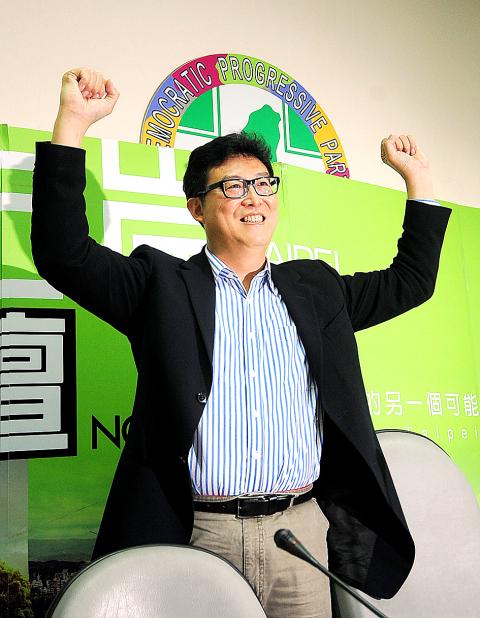Democratic Progressive Party (DPP) Legislator Pasuya Yao (姚文智) has won the party’s first-stage primary for the Taipei mayoral election and will enter the second stage, in which he and independent hopefuls will compete for the final candidacy of the pan-green camp, the DPP said yesterday.
DPP Secretary-General Lin Hsi-yao (林錫耀) at a press conference yesterday morning announced Yao’s victory in a public opinion poll conducted by three institutions on Tuesday night, but did not release the poll results, citing a pre-survey agreement among the three contenders.
However, Yao’s office later released the final tally, which showed that Yao received an average support rate of 30.7 percent, beating lawyer Wellington Koo’s (顧立雄) 27.1 percent and Legislator Hsu Tain-tsair’s (許添財) 24.2 percent.

Photo: Fan Pin-chao, Taipei times
The survey, which pitted each contender against the Chinese Nationalist Party (KMT) candidate, former Taipei EasyCard Co chairman Sean Lien (連勝文), was the first part of a two-stage primary mechanism approved by the DPP.
Lien led every DPP hopeful in the three separate surveys — which collected 3,743 valid samples — with support rates from 38.5 percent to 41.7 percent.
For the second-stage primary, another public opinion poll to decide the final candidate is to be conducted before June 13 between Yao, National Taiwan University Hospital physician Ko Wen-je (柯文哲) — whose support rate has been leading all pan-green camp aspirants — and possibly Neil Peng (馮光遠), an award-winning screenwriter.
The DPP could organize debates between second-stage contenders before the public opinion poll is held, party spokesperson Lin Chun-hsien (林俊憲) said.
A three-member task force has established to handle the “integration talks” between Yao and Ko about a campaign platform, political values and follow-up cooperation after the primary is decided, Lin said.
The first-stage primary between DPP aspirants became a three-way race after former vice president Annette Lu (呂秀蓮) dropped out on Saturday.
After hearing the result, Yao said that he was surprised at how well he has done as an “underdog.”
Judging from past election results in Taipei, he has a chance at defeating the favored Lien as he is trailing by such a small margin with the election still six months away, Yao said.
“Again, I would have to say that the mayoral election in November will be a battle between the privileged class and ordinary citizens,” he said, referring to how he would campaign against Lien.
Koo, who finished second in the first-stage primary, said in a statement released yesterday that he pledged full support to Yao and would keep working for the people.

Taiwan is stepping up plans to create self-sufficient supply chains for combat drones and increase foreign orders from the US to counter China’s numerical superiority, a defense official said on Saturday. Commenting on condition of anonymity, the official said the nation’s armed forces are in agreement with US Admiral Samuel Paparo’s assessment that Taiwan’s military must be prepared to turn the nation’s waters into a “hellscape” for the Chinese People’s Liberation Army (PLA). Paparo, the commander of the US Indo-Pacific Command, reiterated the concept during a Congressional hearing in Washington on Wednesday. He first coined the term in a security conference last

Prosecutors today declined to say who was questioned regarding alleged forgery on petitions to recall Democratic Progressive Party (DPP) legislators, after Chinese-language media earlier reported that members of the Chinese Nationalist Party (KMT) Youth League were brought in for questioning. The Ministry of Justice Investigation Bureau confirmed that two people had been questioned, but did not disclose any further information about the ongoing investigation. KMT Youth League members Lee Hsiao-liang (李孝亮) and Liu Szu-yin (劉思吟) — who are leading the effort to recall DPP caucus chief executive Rosalia Wu (吳思瑤) and Legislator Wu Pei-yi (吳沛憶) — both posted on Facebook saying: “I

Sung Chien-liang (宋建樑), who led efforts to recall Democratic Progressive Party (DPP) Legislator Lee Kun-cheng (李坤城), was released on bail of NT$80,000 today amid outcry over his decision to wear a Nazi armband to questioning the night before. Sung arrived at the New Taipei District Prosecutors’ Office for questioning in a recall petition forgery case last night wearing a red armband bearing a swastika, carrying a copy of Adolf Hitler’s Mein Kampf and giving a Nazi salute. Sung left the building at 1:15am without the armband and covering the book with his coat. Lee said today that this is a serious

A court has approved Kaohsiung prosecutors’ request that two people working for Democratic Progressive Party (DPP) Legislator Lin Dai-hua (林岱樺) be detained, as a probe into two cases allegedly involving her continues. The request was made on Friday, after prosecutors raided Lin’s two offices and the staffers’ residences, and questioned five on suspicion of contravening the Anti-Corruption Act (貪汙治罪條例). The people included the directors of Lin’s Daliao (大寮) and Linyuan (林園) district offices in Kaohsiung, surnamed Chou (周) and Lin (林) respectively, as well as three other staffers. The prosecutors’ move came after they interrogated Lin Dai-hua on Wednesday. She appeared solemn following